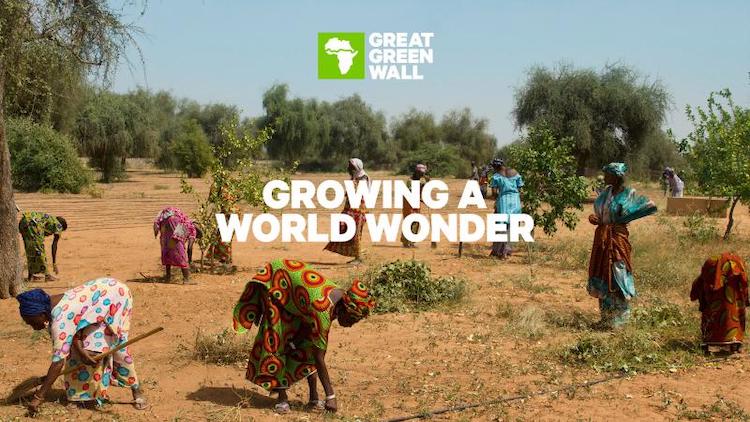
By Rita Joshi
BONN (IDN) – The Great Green Wall (GGW) initiative has over the past 13 years restored close to 20 million hectares of land, according to a report released on September 7 at a virtual meeting of environmental ministers from Senegal, Mauritania, Mali, Burkina Faso, Niger, Nigeria, Chad, Sudan, Eritrea, Ethiopia and Djibouti together with regional partners, international organizations and development agencies.
The GGW Initiative was launched in 2007 under the leadership of the African Union Commission and Pan-African Agency, and with the financial support from the government of Ireland. (P17) JAPANESE TEXT VERSION PDF | SWAHILI
The Initiative unites African countries and international partners to transform the lives of millions of people by growing an 8,000 km long and 15 km wide mosaic of trees, grasslands, vegetation and plants along the southern tip of the Saharan desert. Once complete, the GGW will be the largest living structure on the planet, three times the size of the Great Barrier Reef.
Titled The Great Green Wall: Implementation Status and Way Ahead to 2030, the report is the first comprehensive status testimony. It states that over 350,000 jobs were created and around $90 million in revenues was generated from 2007 to 2018 through the GGW activities.
Over 220,000 people received training on the sustainable production of agro-pastoral and non-timber products to support the shift to more responsible consumption and production. The restored area will sequester over 300 MtCO2 by 2030, roughly 30 per cent of the envisioned target for the GGW.
The report also indicates that to reach the target restoration of 100 million hectares of land by 2030, the GGW countries need to restore 8.2 million hectares of land every year at an annual financial investment of $4.3 billion. The initiative also aims to create 10 million jobs by that date.
“The Great Green Wall can – and will – change the lived reality of millions of our people. More jobs, better health, greater stability. More resilient and cohesive communities and stronger inclusive economic growth,” said UN Deputy Secretary-General Ms Amina Mohammed in her opening remarks to a ministerial meeting.
“As we survey the wreckage of COVID-19 and make our plans to rebuild through robust stimulus packages, it would be a missed opportunity not to see investing in the Great Green Wall as an integral component of an inclusive sustainable economic response and recovery,” Ms Mohammed added.
UNCCD Executive Secretary Mr Ibrahim Thiaw also emphasised: “The GGW is yielding immediate benefits for the local communities and long-term ecosystem benefits at the international level. It shows that when countries dare to dream, work together and make the right choices, we can prosper and live in harmony with nature. And where innovative ideas emerge, positive, dramatic change that benefits both the local and international communities will happen.”
At the closing of the ministerial meeting, a declaration on The Great Green Wall was adopted to highlight the potential of the GGW as one of the levers for achieving the post-COVID economic recovery, poverty reduction, ecosystems restoration, climate change adaptation and mitigation, women empowerment, fight against irregular economic migration and jobs creation.
The declaration emphasizes the need for sustained and multifaceted support as well as the active participation of all partners to achieve the GGW goals.
Ministers, representatives of the member states of the Panafrican Agency of the Great Green Wall of Burkina Faso, Djibouti, Eritrea, Ethiopia, Mali, Mauritania, Niger, Nigeria, Senegal, Sudan and Chad expressed deep concern about “the current global health situation due to the COVID-19 pandemic, whose socio-economic consequences in the short, medium and long term will also have a certain ecological impact”.
Against this backdrop, the establishment of lasting peace and stability in the Sahel region requires joint efforts in the fields of security, economic development and social welfare;
In their declaration, Ministers reaffirmed that the implementation of the Great Green Wall Initiative is and remains a priority for each of our eleven member countries. We reiterate our shared vision of making the Great Green Wall one of the levers for achieving the post-COVID economic recovery, the achievement of the Sustainable Development Goals, the 2063 Agenda and the Paris Agreement in our respective countries.
They called on all partners to provide sustained and multifaceted support to the member countries of the Pan-African Agency for the Great Green Wall, as the implementation of the Great Green Wall is a priority for our States, which can contribute to the creation of jobs, wealth and prosperity.
They urged development partners to combine their efforts and initiatives in order to contribute to, and facilitate, the alignment of interventions aimed, inter alia, at poverty reduction, ecosystems restoration, adaptation to, and/or, climate change mitigation, women empowerment, fight against irregular economic migration and jobs creation in rural areas.
They further called upon their partners, in particular the Green Climate Fund, the United Nations Convention to Combat Desertification, the Global Environment Facility, the World Bank Group, the European Union, the African Development Bank Group as well as the French Development Agency and other interested bilateral partners, to support our States in developing an umbrella program on the Great Green Wall. [IDN-InDepthNews – 16 September 2020].
Image credit: UNCCDC
IDN is flagship agency of the Non-profit International Press Syndicate.











